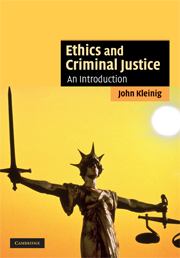6 - Coercion and deception
Published online by Cambridge University Press: 05 June 2012
Summary
The police must obey the law while enforcing the law … in the end life and liberty can be as much endangered from illegal methods used to convict those thought to be criminals as from the actual criminals themselves.
We authorize the police to keep our social peace. To enable them to do this we grant them the prerogatives of sometimes using coercion and deception, conduct that, generally speaking, calls for special justification. In this chapter we explore the ethical foundations for granting police the authority to use coercion and deception as well as the limits we place on their use.
It is a basic ethical presumption of our dealings with one another that we should not act coercively or deceptively without sufficient justification for doing so. The ethical treatment of others requires that we treat them as rational agents who are authors of their own decisions, and not as tools that we may use or manipulate as we like. Coercion and deception – each in its own way – diminishes (and sometimes eliminates altogether) the possibility that others' actions will result from their rational appreciation of the options that are, in point of fact, actually available to them. They constitute conditions for decision-making that, absent special justification, have no place in a liberal society.
Because coercion and deception deform the possibility of others acting in ways that reflect their status as rational agents, why, if at all, should we grant such prerogatives to police?
- Type
- Chapter
- Information
- Ethics and Criminal JusticeAn Introduction, pp. 89 - 110Publisher: Cambridge University PressPrint publication year: 2008



